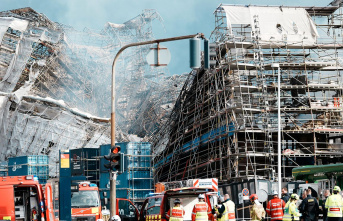Children can convey it effortlessly when they no longer want to. Especially with the first strokes of swimming or before the first jump into deep water. What if the water is still cold? No rather not. In the future, the little swimming beginners could possibly freeze even more.
Because in the energy crisis, a survey by the consulting firm wants Ernst
"However, we experienced a severe setback in the plan to catch up on the corona-related deficits in swimming training due to the energy crisis," says Vogt. She calls for “learning to swim to continue as long as possible and to give it the necessary priority”. She emphasizes: "Being able to swim is just as important as reading, writing and arithmetic."
Many bathrooms closed
Only very recently should the temperature in the teaching pools and swimming pools be reduced to up to 26 degrees in view of the exploding energy prices, which many pools would have exhausted. "Unfortunately, some municipalities have gone further and lowered the water temperature to 25 and below." Some indoor pools were not opened after the summer holidays, others are closed due to renovation. Vogt demands: If a pool is temporarily closed, "swimming training must be guaranteed elsewhere".
Only: The previous restrictions have led to fewer children learning to swim. At a water temperature of 26 degrees, beginner swimming training suffers: “The children freeze faster than at 28 degrees and more, which is why the average training time in the water decreases. Since the air temperature has usually also decreased, it is not so easy to warm up quickly.” Nevertheless, the lifeguards are happy about every swimming pool that is still available.
There is a lack of water areas
Because the number of children who are unsafe in the water has been increasing for a long time. "From our point of view, this is mainly due to the closing of swimming pools. This is accompanied by a further decline in swimming lessons in schools," says Vogt. "One can discuss the extent to which swimming pools have disappeared from the map in Germany since the turn of the millennium. However, no one would deny that the number has declined significantly. Accordingly, schools and training clubs are increasingly lacking water areas." Being able to swim saves lives.
Otherwise, the number of bathing deaths is likely to increase. In fact, the number of fatal swimming accidents nationwide from the beginning of the year to the end of August rose by 44 to 289 deaths compared to the same period last year. That was almost as many as in the whole of 2021, when 299 people died while bathing. The DLRG attributed the increase to the hot period in summer, when many people sought to cool off in rivers, lakes or in the North and Baltic Seas. For the year as a whole, the increase compared to 2021 will remain - the first after three years of declining numbers. Compared to the years before 2021, however, the number of deaths is not exceptionally high.
Lifeguards need places to train
Another problem: "During the first two years of the pandemic, we practically lost a year of lifeguards," says Vogt. The water temperature is less important for lifeguards, but enough water areas are necessary for the training. "And this training takes place in the indoor swimming pools in autumn and winter, so that there are enough volunteers by the water in the summer to ensure safe leisure time," she explains.
"We will recruit new lifeguards where we can." Training is currently underway in many places, and courses should start again in the local groups nationwide after the turn of the year - "if the pools are still available for this".
So everything depends on the bathrooms. "The DLRG is still calling for a round table between the federal, state and local governments, to which the federal government should invite." At the so-called movement summit, they recently agreed to a “round table on exercise and health” in the coming year: “One way would be to expand this to include the swimming pool supply and the demand plan we demand.” For years, lifeguards have been demanding that the federal, state and local governments determine the need for water areas for learning to swim nationwide - and then cover them. That also means investing in existing buildings and new buildings.












